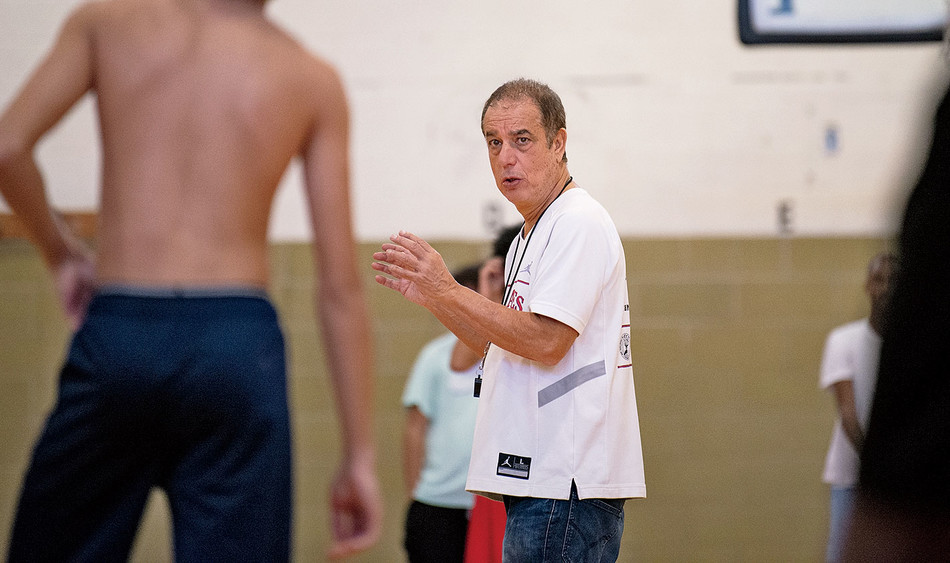Gerard Papa ’72CC, ’74SIPA, ’75LAW talks fast and moves fast. He graduated from high school at fifteen, Columbia College at eighteen, and Columbia Law at twenty-one. “I just look dumb,” he jokes. His accent is pure old-school Bensonhurst, a southern-Brooklyn neighborhood where Papa lives in an old Victorian house with faded yellow shingles and a statue of the Virgin Mary in the backyard. He has always lived here.
A retired Wall Street lawyer, Papa is the founder of Flames, a local youth-basketball program that he started in 1974, and which he integrated at a time when “you could get killed for being in the wrong neighborhood,” he says. Bensonhurst was no different: heavily Italian, the enclave was notoriously hostile to outsiders, especially Black people.
Inside Papa’s house is a long shelf jammed with trophies that Flames teams have won over the years, and also basketballs signed by inmates from Queensboro Correctional Facility (Papa takes his best players to compete against prison teams around New York State). “I haven’t dusted these trophies since my mother died,” Papa says. Elena Papa passed away in 2015. Papa calls her “the grandmother of Flames” — her grandchildren being the more than twenty-two thousand boys who have donned a Flames uniform in the past fifty years.
At seventy-one, Papa still runs Flames himself, with his own money. Much of that money came to him as civil damages for the night in 1986 when undercover cops ambushed him on a dark stretch of road near Coney Island Creek. They fired at his car, then dragged him out and beat him senseless. A grand jury ruled it a case of mistaken identity, though Papa maintains that it was a vendetta for his having blown the whistle on local pols who had misspent funds intended for youth programs.
But Papa, a devout Catholic, doesn’t hold grudges. More than a few Flames alumni became cops themselves. He’s sociable with all sorts — “That’s the story of my life — being friends with people different from me” — and doesn’t push any savior narratives about himself. “I just wanted to coach a damn basketball team,” he says. His all-white team that first year was lousy, and so, wanting better, Papa crossed an unthinkable line. He started recruiting Black kids from the nearby projects.
A priest in Bensonhurst let Flames set up hoops in the church’s bingo hall, which allowed Papa’s kids to compete in the citywide Catholic Youth Organization (CYO) basketball league. “That’s when all hell broke loose,” Papa says. The white parishioners were furious. Papa faced death threats. Someone slashed the tires of his blue Thunderbird. Fights erupted on the courts, in the bleachers, on the streets. “These were the only Black kids in the league. Every game, home and away, was like, ‘How are we going to not get people killed?’” The following year, Flames won the CYO championship. “That put us on the map,” Papa says. “Now everybody wanted to play for us. We integrated both the neighborhood and the CYO.”
These days, Flames is based out of a gym at John Dewey High School in Gravesend. Papa paid for the backboards and the clock, and he controls the space. He’s a rules guy, and there are strict rules of conduct at Flames. But he can’t control everything: he’s been to too many funerals to imagine otherwise. Nor can he stop his world from changing: about twenty years ago, he says, Russians, Middle Easterners, and Chinese people started moving in to the neighborhood, a shift that is reflected in the players. “The Italians went to Staten Island and New Jersey. If you wanna hear a Brooklyn accent, you have to go to Staten Island.”
Earlier this year, to celebrate fifty years of Flames, Papa held a banquet in the St. Regis Hotel on E. 55th Street. The crowd was like a hard-boiled Pete Hamill column come to life: cops and firefighters, judges and bishops, prison guards and journalists, and a couple of Columbia deans. Jackets, ties, clerical collars. Flames alumni, Black and white, had gathered from all over the country. Old teammates met again in middle age, still separated by culture but connected in deeper ways. Papa moved through the room, greeting people and posing for group pictures. In the end, he feels he has touched more lives through youth basketball than he ever would have, had he become (as he once considered) a priest or a politician.
Having walked the walk, Papa has little patience for what he sees as liberal pieties about social issues: “The best way not to solve the race problem is to have a ‘national conversation’ about race,” he says. “You gotta move on and do positive things together. That’s what I do. That’s what Flames is. Just do it.”
This article appears in the Fall 2024 print edition of Columbia Magazine with the title "A Team Grows in Brooklyn."



